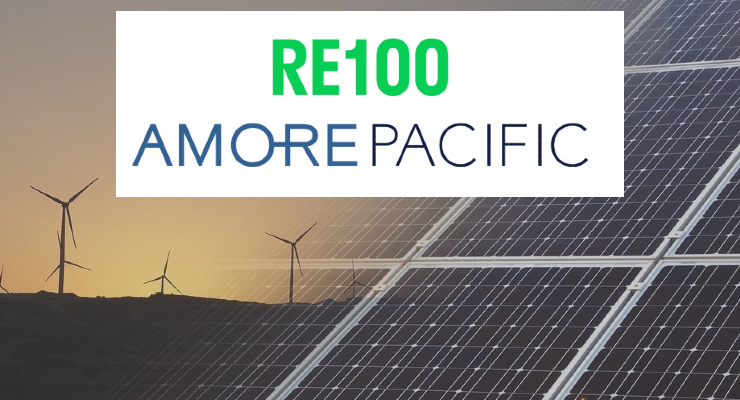Charles Sternberg, Assistant Editor03.10.21
Amorepacific has joined the global RE100 initiative with a goal to source 100% renewable energy to power all of its production sites and offices by the year 2030—the first Korean beauty company to do so.
RE100 is a global collaborative initiative among companies committed to using 100% renewable energy. The program was launched by the international non-profit organization, The Climate Group, in partnership with CDP, in 2014. As of March 2021, over 290 companies, including Google, Microsoft and Apple, have joined the initiative. Amorepacific is the first from the Korean beauty industry to become a member of the global RE100.
Suh Kyung-bae, chairman and CEO of Amorepacific Group, said, "Amorepacific agrees that resolving the climate issue is an essential agenda not only for corporate sustainability but for the survival of humanity. By achieving the RE100 goal by 2030, we hope to contribute to international climate action. As a global corporate citizen, we will cooperate to reduce our carbon footprint."
Reducing Environmental Impact
To achieve the 100% renewable energy goal, Amorepacific will utilize advanced technologies to manufacture products at lower temperatures, thus reducing the environmental impact in all of the development and production stages. It will also develop more low-carbon footprint products using ingredients and packaging materials with lower GHG emissions based on LCA (Life Cycle Assessment) results.
In addition, Amorepacific will utilize 3rd party PPAs and green contracts operated by the Korean government. In February 2021, Amorepacific purchased the Green Premium policy, which will replace 30% of the 2021 estimated power demand for its production center in Osan with renewable energy.
"By committing to 100% renewable electricity by 2030, Amore Pacific is taking an important step toward improving its sustainability, joining a growing number of companies committed to driving market change. This sends a powerful message that renewable electricity makes good business sense, and we encourage others to follow," commented Aleksandra Klassen, RE100 senior impact manager, The Climate Group.
RE100 is a global collaborative initiative among companies committed to using 100% renewable energy. The program was launched by the international non-profit organization, The Climate Group, in partnership with CDP, in 2014. As of March 2021, over 290 companies, including Google, Microsoft and Apple, have joined the initiative. Amorepacific is the first from the Korean beauty industry to become a member of the global RE100.
Suh Kyung-bae, chairman and CEO of Amorepacific Group, said, "Amorepacific agrees that resolving the climate issue is an essential agenda not only for corporate sustainability but for the survival of humanity. By achieving the RE100 goal by 2030, we hope to contribute to international climate action. As a global corporate citizen, we will cooperate to reduce our carbon footprint."
Reducing Environmental Impact
To achieve the 100% renewable energy goal, Amorepacific will utilize advanced technologies to manufacture products at lower temperatures, thus reducing the environmental impact in all of the development and production stages. It will also develop more low-carbon footprint products using ingredients and packaging materials with lower GHG emissions based on LCA (Life Cycle Assessment) results.
In addition, Amorepacific will utilize 3rd party PPAs and green contracts operated by the Korean government. In February 2021, Amorepacific purchased the Green Premium policy, which will replace 30% of the 2021 estimated power demand for its production center in Osan with renewable energy.
"By committing to 100% renewable electricity by 2030, Amore Pacific is taking an important step toward improving its sustainability, joining a growing number of companies committed to driving market change. This sends a powerful message that renewable electricity makes good business sense, and we encourage others to follow," commented Aleksandra Klassen, RE100 senior impact manager, The Climate Group.




























